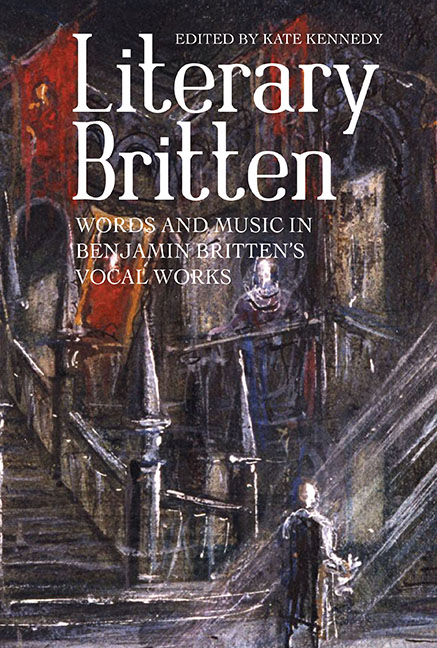Book contents
- Frontmatter
- Contents
- List of Illustrations
- List of Music Examples
- List of Contributors
- Introduction
- Part I Perspectives
- 1 Britten and His Librettists: The Composer as Auteur
- 2 Britten, Auden and the 1930s
- 3 James, Britten, Piper and the Literary Supernatural: The Changing ‘vision of evil’ in The Turn of the Screw and Owen Wingrave
- 4 ‘Thought's Wildernesses’: The Development of Britten's Nocturne from Library to Score
- 5 ‘Reading at Intervals’: Britten's Romantic Poetry
- 6 Britten's Drops: The Lyric into Song
- 7 ‘Without any tune’: The Role of the Discursive Shift in Britten's Interpretation of Poetry
- 8 Britten and Modern Tragedy
- Part II Studies
- Bibliography
- Index
8 - Britten and Modern Tragedy
from Part I - Perspectives
Published online by Cambridge University Press: 17 July 2019
- Frontmatter
- Contents
- List of Illustrations
- List of Music Examples
- List of Contributors
- Introduction
- Part I Perspectives
- 1 Britten and His Librettists: The Composer as Auteur
- 2 Britten, Auden and the 1930s
- 3 James, Britten, Piper and the Literary Supernatural: The Changing ‘vision of evil’ in The Turn of the Screw and Owen Wingrave
- 4 ‘Thought's Wildernesses’: The Development of Britten's Nocturne from Library to Score
- 5 ‘Reading at Intervals’: Britten's Romantic Poetry
- 6 Britten's Drops: The Lyric into Song
- 7 ‘Without any tune’: The Role of the Discursive Shift in Britten's Interpretation of Poetry
- 8 Britten and Modern Tragedy
- Part II Studies
- Bibliography
- Index
Summary
Finality is so appealing, so adamant. Tragedy has been hailed, and arraigned, for fixing our attention on endings, on last things. And not just our attention but also our passions, appetites, energies, cleansing and disciplining them, or, draining them of their power to change the world. But the art of tragedy is also a means of thinking about this powerful, dangerous drive to finality. It is, I suggest, a studied embodiment of this allure.
Let me begin with an ending. I shall in due course focus on Britten's works for the stage, but many of his non-dramatic works also give voice to the passions we associate with tragedy. Not that a distinction between ‘dramatic'and ‘non-dramatic’ is helpful, where music is concerned. A recital for solo voice and piano of Britten's settings of poems by Michelangelo, Donne, Blake, Hardy, Auden and so on is itself a performance, on a stage, however small.1 Nevertheless it is worth noting that the more minimal the staging, the more the voice can express collective, anonymous, traditional experience, as song has always been able to do within dramatic performance, from Greek choral lyric onwards to Shakespeare's solo clowns and beyond. I am thinking here in particular of Britten's folk-song settings, backed by the piano, and of the terrifying ‘This ae night’ in the Serenade for Tenor, Horn and Strings, with the great French horn obbligato.
Let us consider then the last of the eight songs that make up Winter Words (1953), Britten's setting of poems by Thomas Hardy. Here are the words of ‘Before Life and After’.
A time there was – as one may guess
And as, indeed, earth's testimonies tell –
Before the birth of consciousness,
When all went well.
None suffered sickness, love, or loss,
None knew regret, starved hope, or heart-burnings;
None cared whatever crash or cross
Brought wrack to things.
If something ceased, no tongue bewailed,
If something winced and waned, no heart was wrung;
If brightness dimmed, and dark prevailed.
No sense was stung.
But the disease of feeling germed,
And primal rightness took the tinct of wrong;
Ere nescience shall be reaffirmed
How long, how long?
- Type
- Chapter
- Information
- Literary Brittenwords and music in benjamin britten's vocal works the boydell, pp. 171 - 184Publisher: Boydell & BrewerPrint publication year: 2018

